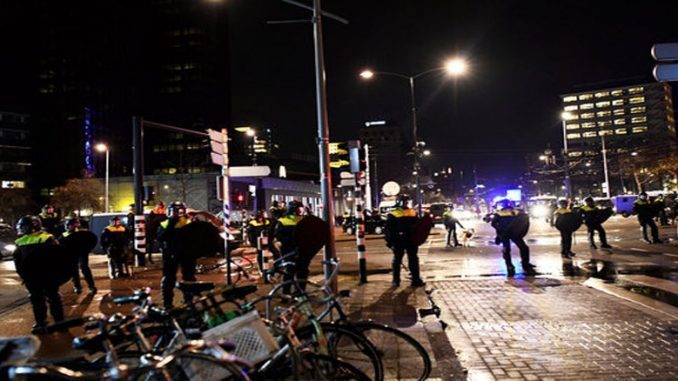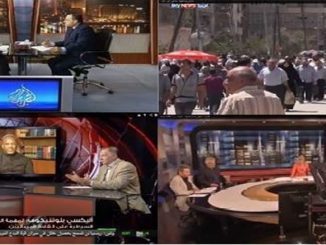
 BY: İBRAHIM KALIN*
BY: İBRAHIM KALIN*
The Dutch government’s enmity against Turkish ministers shows something deeper than the violations of diplomacy, international laws and freedom of speech which is the emergence of European hypocrisy
What happened over the last weekend in Rotterdam, Netherlands goes beyond a mere diplomatic spat and is symptomatic of a deeper problem. It reflects the extremely worrying trends of Islamophobia and xenophobia that are gaining currency in Europe. This is turning into a test for European democracies.
The events of the last three weeks were triggered by the decision of German local authorities to cancel public appearances by Turkish ministers ahead of the April 16 constitutional referendum in Turkey. About 5 million Turks living across Europe reflect the diversity of the Turkish societal scene and nearly half of them are eligible voters. It is only natural that they invite ministers and party officials from Turkey for programs. This has been the practice in the past without any major problems. It all seems to have changed this year. On March 10, the Netherlands, supposedly one of the most diverse and tolerant countries in Europe, joined the foray by taking the most radical and unacceptable course of action and banned Foreign Minister Mevlüt Çavuşoğlu from flying into the country.
The Dutch authorities also denied Fatma Betül Sayan Kaya, minister of Family and Social Policies, access to the Turkish consulate in Rotterdam in a clear breach of diplomatic conventions and traditions. Turkey’s top diplomats in the Netherlands, who enjoy diplomatic immunity, were locked up in the consulate for hours and prevented from meeting the minister. After hours of negotiations and two phone calls between Turkish and Dutch prime ministers to find a peaceful resolution to the crisis, the Dutch police moved in and used force against peaceful protesters who had come to exercise their democratic rights. This went down as a dark night for Dutch democracy.
This cannot be merely explained away by the upcoming election in the Netherlands. It is more serious. The Dutch government, which will seek re-election on March 15, has succumbed to the pressure and whims of Geert Wilders’s self-proclaimed Party for Freedom (PVV), the openly racist and most anti-Islam political party in Europe. Anti-immigration, xenophobic and racist movements are increasingly shaping mainstream European politics. Instead of offering an alternative political outlook, European politicians are giving in to the type of racist and anti-Muslim populism that undermines the core values of democracy, civility, multiculturalism and human rights. To be clear, Wilders is celebrating. He has been joined by all of the far-right and racist political pundits in Europe as well as in the U.S. The tilting of European politics to far-right extremism reveals once again the limits of pluralism and multiculturalism when it comes to Islam and Muslims.
Some European politicians argue that Turkish political issues should not be brought to Europe. This would have been a reasonable argument if only it were true. Most European countries allow and in some cases openly support groups that oppose the current government and President Recep Tayyip Erdoğan. They are allowed to hold rallies and hall meetings to attack Turkey and bash its president. Even terrorist groups, including the PKK and the Revolutionary People’s Liberation Party-Front (DHKP-C), roam freely in European capitals, recruit members, collect money and run smear campaigns. Those who advocate the “no” vote in the April 16 referendum are allowed to hold programs in the very same countries that banned Turkish ministers and politicians who campaign for “yes.” By displaying such double standards, these European governments and politicians are clearly taking sides in a political campaign in Turkey. So, who is bringing Turkish political issues into Europe?
The Dutch government’s hypocrisy is even worse. On Jan. 16, the Dutch Embassy in London held an election event attended by three Dutch politicians and about 100 Dutch citizens living in the U.K. Just last week, spokespeople for the “no” campaign spoke at public events in the Netherlands and they were neither asked to cancel their appearances nor to leave the country. Does this mean that the Dutch authorities are actively campaigning for the “no” vote against constitutional reform in Turkey? Furthermore, it is important to note that Turkish politicians talk about the referendum in Turkey as opposed to Dutch or German elections.
What happened over the last couple of weeks is a reflection of a deeper crisis in Europe where anti-Muslim demonization is used as a political tool, the stigmatization of law-abiding minority communities is legitimized and the good old-fashioned racism is normalized. Plus, there is the new anti-Erdoğan animosity that comes out of certain circles in Europe – an obsession that is manufactured carefully and spread around the world systematically.
European democrats should have come out and condemned the actions of the Dutch government when it prevented a minister from entering her country’s consulate and used dogs to attack a peaceful crowd. Instead, there is a deafening silence. Had this incident happened in another context, all European politicians and EU institutions would have raised hell, made one statement after another and pressured the Dutch government to correct its mistake. Instead, they are coming out in support of it. This is more than double standards. This is not European solidarity. This is a shameful act of self-appeasement that will only make anti-Muslim racists and xenophobes of the West happy.
*Ibrahim Kalin is the spokesperson for the Turkish presidency.
(Published in Daily Sabah Turkish newspaper on Monday, March 14, 2017)



